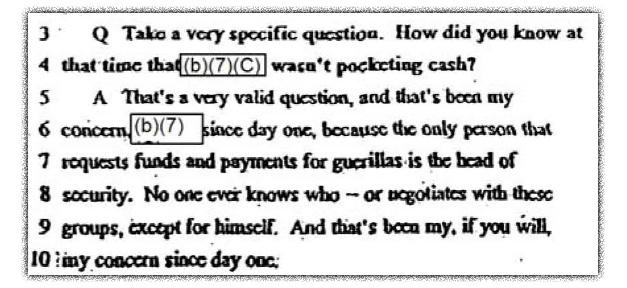Washington, D.C., December 21, 2018 – Banana executives with Chiquita Brands now the subject of a major criminal investigation in Colombia were instrumental in the development and execution of company policies surrounding secret payments to Colombian guerrilla and paramilitary groups, according to an article and Web posting published today by National Security Archive senior analyst Michael Evans.
The National Security Archive is publishing its findings in collaboration with VerdadAbierta, a longtime Archive partner that works to shed light on the roots of Colombia's conflict. The new publications synthesize information drawn from public sources and a 48,000-page trove of corporate records obtained through the Archive's Freedom of Information Act lawsuit.
Among the highlights of today's posting is the secret deposition of John Paul Olivo, who from 1996-2001 was the chief financial officer for Banadex, Chiquita's wholly-owned subsidiary in Colombia. In hours of secret testimony before the U.S. Securities and Exchange Commission (SEC), Olivo detailed the steps the company took to negotiate, approve and conceal the illegal payments to armed groups in Colombia, acts that the Colombian prosecutor says are crimes against humanity.
Today's Web posting looks at the role of Olivo and a dozen other fruit company executives named in the Colombia case, including Charles Keiser, the longtime general manager at Banadex who oversaw the illegal payments process and personally authorized many of the secret expenditures. Also profiled is Álvaro Acevedo, who succeeded Keiser as general manager and who "became increasingly concerned" that the company was using his personal salary to smuggle money into the country intended for illegal paramilitary groups.
Among the most important figures profiled here is Victor Buitrago, the former Banadex security manager. Buitrago was a central player in the paramilitary payments operation, a primary witness to how the mechanics of the scheme evolved during that time, and one of the figures involved in the decision to continue the payments after it was learned that the AUC paramilitary group had been designated a Foreign Terrorist Organization by the United States. Olivo and other witnesses describe a system in which Buitrago and the previous security manager, Juan Manuel Alvarado, operated without any effective oversight. Olivo told the SEC that "the only person that requests funds and payments for guerrillas is the head of security. No one ever knows who – or negotiates with these groups, except for himself. And that’s been my, if you will, my concern since day one."
The Chiquita 13: Profiles of Banana Executives Accused of Crimes Against Humanity in Colombia
By Michael Evans
Few people working at Chiquita Brands International knew more about the company’s secret payments to Colombian terrorist groups than John Paul Olivo. As chief financial officer of Chiquita’s Colombia-based operations from 1996-2001, one of Olivo’s duties was to keep track of hundreds of thousands of dollars the company secretly funneled to leftist insurgents and right-wing “paramilitary” groups, key players in Colombia’s decades-old internal conflict.
Summoned for questioning by the U.S. Securities and Exchange Commission (SEC) in 1999, Olivo had a lot to say about the expenditures. He told investigators that he felt “uneasiness” about the system the company had in place to track the payments. As a professional auditor, Olivo was concerned about the lack of effective controls, explaining that a single person, the security manager in Colombia, negotiated with the groups, requested the payments, and delivered the funds—often through a third party. There were no receipts and there was no way to know to whom the money was given.[1]
[H]e [the security mananger] coordinates that money himself, and through an intermediary, the money is taken to, if you will, the jungles of where they are and distributed. I don’t know – there’s no code, secret code, as to if it’s to the left wing or the right wing, or who it is.[2]
More than ten years have passed since Chiquita pleaded guilty in U.S. federal court to financing one of these groups, the United Self-defense Forces of Colombia (AUC), which was designated a “Foreign Terrorist Organization” by U.S. Secretary of State Colin Powell in 2001. But despite the admission, a $25 million fine, and years of civil litigation in U.S. courts brought by the AUC’s victims, not a single officer or employee of the company has ever been prosecuted or held responsible for the crime, either in the United States or in Colombia.
But all of that might be about to change. Earlier this year, the Colombian attorney general’s office announced that it had filed charges against Olivo and 12 other Chiquita officials—including the security manager mentioned in his testimony—for secretly financing an AUC paramilitary front from 1996-2004. After so many years of impunity, the decision to prosecute former banana executives for what the prosecutor says are “crimes against humanity” opens a dramatic new chapter in the long and tragic history of Chiquita’s involvement in Colombia.
Today, the Archive publishes a profile of the 13 accused banana executives, drawing on available public sources and a 48,000-page trove of the company’s internal records gained through the Archive’s successful Freedom of Information Act (FOIA) lawsuit.
The result is a complex but unfinished portrait of the individuals that Chiquita sent to the front lines of Colombia’s civil war and who became financiers of the most-feared armed groups in Colombia.
What are the charges?
The 13 men are accused of funding the AUC’s Arlex Hurtado Front, a paramilitary group active on Colombia’s Caribbean coast, the hub of Chiquita’s banana empire in Colombia.
Colombia’s attorney general (Fiscalía General de la Nación) indicted the group’s leader, Raúl Emilio Hasbún Mendoza (“Pedro Bonito”), and 30 of its members in February 2017 for a systematic campaign of violence against the civilian population, including acts that the Fiscalía has deemed crimes against humanity.[3] Hasbún has confessed to countless human rights violations, including the infamous 1997 massacre at Mapiripán.
A well-known banana impresario from Urabá, Hasbún relied on a network of government-backed self-defense groups called “Convivir” to supplement his paramilitary forces and to launder contributions from businesses like Chiquita.[4] Former president Álvaro Uribe Vélez, then the governor of Antioquia, who is accused of organizing his own paramilitary group, was one of the most vocal supporters of the Convivir groups in Urabá. In the indictment, the prosecutor asked that Uribe, now a senator, and another former governor be investigated for “omission” in allowing the Convivir groups to engage in illegal activities.
The AUC was a confederation of anti-insurgent militia forces responsible for many civilian massacres, assassinations and forced displacements starting in the mid-1990s. Some members of the Colombian security forces, including senior officers, collaborated with the AUC, while many others simply turned a blind eye to its atrocities. The AUC was also a major narcotics-trafficking organization and sometimes used Chiquita’s ports and vessels to move drugs out of Colombia.
With the indictments of the Chiquita 13, the prosecutor asserts that third parties who financed or supported Hasbún’s paramilitary front—like the accused Chiquita officials—are also guilty of crimes against humanity. The designation means that the statute of limitations, which in other cases would preclude the prosecution of crimes from so long ago, does not apply in the cases of these 13 individuals.
Who are the Chiquita 13?
Why has the prosecutor chosen to focus on this group of mid-level executives and not more senior officials at Chiquita who are known to have been key decision-makers in the paramilitary payoff scheme?
The accused include eight Colombians, three U.S. citizens, one Honduran and one Costa Rican national. This is essentially the same list of officials identified by Colombian prosecutors in 2008, when the Fiscalía first investigated the Chiquita paramilitary payoffs.
One thing these 13 individuals have in common: they all worked in Colombia for Chiquita’s Colombian subsidiaries and related enterprises. None of the US- or Costa-Rica-based officials involved in the payments are named in the case. It would appear that for jurisdictional reasons the prosecutor’s office is focusing only on crimes committed in Colombia by Chiquita’s Colombia-based staff.
The list of US-based executives not named in the indictment but who played key roles in developing, implementing and overseeing policies on making “sensitive payments” during that period includes John Ordman, Senior Vice President for European Banana Sourcing, Robert Kistinger, President of the Chiquita Fresh Group, Robert Thomas, Chiquita’s senior counsel, William Tsacalis, the chief accounting officer, and Wilfred “Bud” White, Vice President of Internal Audit.[5]
Unlike the U.S. prosecution that concluded with Chiquita’s 2007 guilty plea, in Colombia prosecutors are looking at all of the company’s payments to paramilitaries, including some five and a half years of financial support not included in the U.S. case. The Department of Justice (DOJ) prosecution only examined payments made after September 10, 2001, when the State Department designated the AUC as a Foreign Terrorist Organization (FTO), limiting the scope of prosecutable offenses.
The Colombian prosecutor is investigating individuals, not a corporate entity, as was the case in the United States. In a Factual Proffer outlining the terms of the plea deal, DOJ did not even publish the names of the Chiquita officials behind the terrorist payments, much less prosecute them.[6] Likewise Chiquita, in its own post-mortem on the illegal payments saga, the 2009 report of the Special Litigation Committee (SLC Report), anonymized the names of corporate officers and employees involved in the scheme.
The Archive’s analysis of more than 48,000 pages of the company’s internal records (made possible through a Freedom of Information Act (FOIA) lawsuit) helped us to identify Chiquita officials whose names were scrubbed from the public versions of those reports. The Archive’s FOIAs also uncovered the secret depositions of seven top Chiquita executives linked to the illegal payments, only one of whom (Olivo) is named in the Colombian prosecution.
In a 2017 declaration for the International Criminal Court, the Archive identified all ten Chiquita officials anonymously “named” in the Factual Proffer, eight that were pseudonymously represented in the SLC report, and all seven Chiquita officials deposed by the SEC in 1999-2000 about the company’s security payments. The process of identifying these individuals effectively stripped away the redactions that had shielded Chiquita personnel from scrutiny, providing a far clearer picture of each individual’s role in the paramilitary payments. Recently, the ICC announced that it would be keeping tabs on Colombia’s investigation of the Chiquita 13.
The Archive used a similar process of analysis and cross-referencing to construct the following profiles for the recently-indicted banana executives, combining evidence from Chiquita’s own archives with information drawn from the DOJ Factual Proffer, Chiquita’s SLC Report, and other sources.
Profiles of the Chiquita 13
The Chiquita 13 can be divided into two main groups:
- Senior managers and officers from Banadex (9) – The list includes the security manager, two general managers, two chief financial officers, the chief of labor relations, and three legal representatives who worked at Banadex, Chiquita’s primary Colombian subsidiary in those years.
- Legal representatives and executives from other Chiquita-related holdings (4) – The prosecutor has also accused the president, secretary general, and two attorneys from Banacol. In 2004, Chiquita’s sold its Colombia-based holdings to Banacol, a Colombian company that produces and ships bananas from Colombia.
General Managers
Charles Dennis “Buck” Keiser
Keiser was the general manager of Banadex from 1989-2000 and a central player in all of Chiquita’s business and security operations in Colombia. He was based in Medellín and reported directly to John Ordman, the Senior Vice President for European Banana Sourcing of the Chiquita Fresh Group who was based in Costa Rica.
Internal memos obtained through the Archive’s FOIA work show that Keiser negotiated and authorized many of the company’s “sensitive payments” to guerrilla and paramilitary groups. With guidance from senior officials, Keiser used a special account ostensibly for general manager’s expenses to launder money intended for guerrilla and paramilitary groups.
According to the SLC Report, Keiser, identified here as “Banadex Employee #1,” was involved in the very first payment made to a Colombian guerrilla group in the late-1980s.
[A]t some point between 1987 and 1989, Banadex received a demand for payment from the FARC in the amount of $10,000, delivered by a FARC representative to [a Banadex farm manager]. [The Banadex farm manager] told [Banadex Employee #1] about the demand. According to [Banadex Employee #1], it was apparent to “everyone” that if the payment was not made, “people would be kidnapped.” As Banadex’s farm ownership had expanded, the Company’s personnel had become increasingly aware of the growing risk that it would face extortion demands. This was the first demand.
Keiser discussed the demand with Ordman and was soon called to company headquarters in Cincinnati, Ohio, to talk it over with senior Chiquita executives. There he met with Robert Kistinger, Ordman’s boss, along with Dennis Doyle, vice president of Chiquita’s Banana Group, and Charles Morgan, then Chiquita’s general counsel. Doyle approved the payment: “Let’s pay it,” he reportedly said. The SLC Report added that “no alternatives to making the payment were discussed at the meeting.”[7]
Ordman (“Chiquita Employee #2”) later met Keiser in a hotel room in Guatemala and gave him $10,000 in cash for the first FARC payment.
After the meeting, [Chiquita Employee #2] instructed [Banadex Employee #1] to meet him at a hotel in Guatemala in order to put the payment process in motion. [Chiquita Employee #2] had come from Honduras, where he had obtained $10,000 from the General Manager’s Fund (generally, an account in a division’s general ledger from which the General Manager is permitted to make discretionary payments), which he gave to [Banadex Employee #1], who brought it back to Colombia. [Banadex Employee #1] then delivered the cash (which he arranged to be converted from dollars to pesos) to [the Banadex farm manager], who in turn delivered the payment to the FARC.[8]
Over the ensuing decade, Keiser oversaw a variety of different schemes used by the company to conceal so-called “sensitive payments” to guerrilla insurgents, paramilitary groups, and the Colombian security forces. His name and signature are found on many of the forms approving payments. In authorizing the expenditures, Keiser worked closely with members of the Banadex security staff, including Juan Manuel Alvarado and Victor Buitrago Sandoval, and the Banadex financial officers, Jorge Fortón, John Paul Olivo and Fuad Giacoman.
Some of Keiser’s payment approval memos show that he sought to negotiate a quid pro quo with guerrilla groups. A 1993 memo requesting funds for the FARC guerrillas includes handwritten annotations from Keiser saying, “We should get from them an understanding not to block anything we do with the sindicato [labor union].”[9]
As general manager, Keiser was also one of the key Banadex officials negotiating the company’s initial encounters with paramilitary groups. He told the SLC that he “viewed the convivir payments as within the authority he had been granted many years earlier to make payments necessary to preserve and protect the Company’s personnel and property.”[10]
Keiser and another one of the Chiquita 13, Reinaldo Escobar de la Hoz, a Banadex attorney, met secretly “in or about” 1997 with AUC leader Carlos Castaño to negotiate payment arrangements with a paramilitary group based in Urabá.[11] Their encounter with Castaño is also described in the Factual Proffer, where Keiser is identified as “Banadex’s then-General Manager.”
Defendant CHIQUITA began paying the AUC in Urabá following a meeting in or about 1997 between then-leader of the AUC, Carlos Castaño, and Banadex’s then-General Manager. At the meeting Castaño informed the General Manager that the AUC was about to drive the FARC out of Urabá. Castaño also instructed the General Manager that the defendant CHIQUITA’S subsidiary had to make payments to an intermediary known as a “convivir.”[12]
The Chiquita Papers include several records documenting the encounters of Keiser and other officials with the AUC, including a series of memos written by Chiquita senior counsel Robert Thomas in the summer of 2000.
Thomas was investigating payments Banadex was making to Inversiones Manglar, a front company created by Santa Marta-based paramilitaries to launder contributions from Chiquita and other firms. In handwritten notes from his debrief of Chiquita’s director of security, Alejandro “Al” Bakoczy, and a subsequent memorandum to file, Thomas describes how and when the Convivir payments began in each zone.[13]
Thomas’ memo said that Keiser and Escobar felt they “had no choice but to attend the meeting” with Castaño as “refusing to meet would antagonize the Colombia military, local and state government officials, and Autodefensas.”[14]
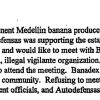
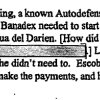
Not long after the meeting, Keiser (“Banadex Employee #1”) told the Banadex security manager, Juan Manuel Alvarado (“Banadex Employee #3”), to begin transferring money to a Convivir in Urabá.
Shortly after the meeting with Castaño, [Banadex Employee #1] told [Banadex Employee #3] that Banadex would have to begin making payments to the paramilitaries in Urabá. At [Banadex Employee #1’s] direction, [Banadex Employee #3] then attended a meeting with the paramilitaries at a gas station near the Company’s offices. At the meeting, a man who called himself “Michael” and who identified himself as a paramilitary commander, demanded that the Company pay his group 10 million pesos per month. [Banadex Employee #3] discussed the demand with [Chiquita Employee #1][15] and [Banadex Employee #1], and they authorized the payment.[16]
But the SLC comes to no definitive conclusion about exactly when the first Convivir payment was made. Keiser himself told the SLC that they had made some Convivir payments before the Castaño meeting.[17]
In any case, the first recorded payment to a Convivir—for just shy of $35,000—was made on June 23, 1997, and was approved by Keiser. The Chiquita Papers include a memo bearing that date, requesting funds for the “Punte Piedra” Convivir, and including the handwritten annotation: “NO alternative. But next year needs to be less.”
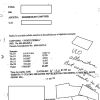
However, in an article published last year with VerdadAbierta, we found that the first payments to rightist militia groups occurred as early as 1992, when Chiquita began to pay the Comandos Populares. Banadex security reports from that era identify the Comandos as “the armed wing” of the Esperanza, Paz y Libertad political movement. By 1995, Colombia’s security team said there was a “nexus” between the Comandos and a group of paramilitaries that had recently arrived in the region and who were “ready to do away with everything that smells communist.” The Comandos had “initiated joint patrols” with the newly-arrived paramilitaries, according to the report.
Keiser authorized the company’s first negotiations with Hasbún’s paramilitaries in 1999. Juan Manuel Alvarado, then the Banadex security manager, came to Keiser and told him that Irving Bernal, the same banana producer who set up the earlier meeting with Castaño, had arranged a meeting with another paramilitary group in Santa Marta.[18]
Thomas’ September 2000 memo describes the subsequent meeting between Alvarado and the paramilitary “collector” who directed him to make payments through a company called Inversiones Manglar.
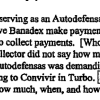
Keiser continued to work for Chiquita after leaving the general manager position in 2000 and was part of the “deal team” that negotiated the sale of Banadex to Banacol in 2004.[19]
Álvaro Acevedo González
Acevedo took over as Banadex general manager in 2001 and assumed Keiser’s role as the individual responsible for negotiating and authorizing the paramilitary payments. Shortly after he started as general manager, Acevedo received an email from Steven Kreps, Vice President for Internal Audit at Chiquita, who attached a copy of his 1999 memo detailing how to account for “confidential payments” like those to the Convivirs.[20]
Beginning in March 2002, Chiquita and Banadex implemented new procedures under which Acevedo’s salary was artificially inflated as a means of bringing cash into the country for payment to paramilitary groups.[21]
A January 2003 email from Banadex CFO Fuad Giacoman and addressed to Acevedo and others explains how an increase in Colombian income tax would effectively increase the amount of money the company paid in security payments, since they were disguising the payments as “manager fund payments.”
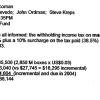
Acevedo’s exact role in making the paramilitary payments after new payment procedures were implemented in March 2002 is described in the Factual Proffer, highlighting the increased risk faced by Acevedo as a result of the company’s deception and the artificial inflation of his salary. (Note: Acevedo is identified here as “Individual F.” “Individual G” is Víctor Julio Buitrago Sandoval, head of security for Banadex.)
Individual F received a check that was made out to him personally and drawn from one of the Colombian bank accounts of defendant CHIQUITA’S subsidiary [Banadex]. Individual F then endorsed the check. Either Individual F or Individual G cashed the check, and Individual G hand-delivered the cash directly to AUC personnel in Santa Marta… Banadex treated these direct cash payments to the AUC as payments to Individual F, recorded the withholding of the corresponding Colombian tax liability, reported the payments to Individual F as such to Colombian tax authorities, and paid Individual F’s corresponding Colombian tax liability. This treatment of the payments made it appear that Individual F was being paid more money and thus increased the risk that Individual F would be a target for kidnapping or other physical harm if this became known… Individual F also maintained a private ledger of the payments, which did not reflect the ultimate and intended recipient of the payments. The private ledger only reflected the transfer of funds from Individual F to Individual G and not the direct cash payments to the AUC.[22]
The SLC Report indicates that by early 2003 Acevedo—who is identified in the report as “Banadex Employee #10”—“became increasingly uncomfortable with the payment method that grossed up his salary, and his concerns were communicated to management in Cincinnati… [Acevedo] felt that internal and government records showing the amounts of money flowing to him, including for salary and the AUC payments, exposed him to increased risk of kidnapping or other harm.”[23]
Despite (or perhaps because of) these concerns, Acevedo was among a handful of Banadex and Chiquita officials who are known to have been involved with the decision to continue making payments to the AUC after the date that the company says it learned that the group had been designated as a Foreign Terrorist Organization (FTO) by the U.S. State Department.
According to the SLC Report, Acevedo was present at an April 2003 meeting in Cincinnati where company officials discussed alternatives in light of the supposed discovery that the AUC had been designated as a terrorist organization 19 months earlier in September 2001. Acevedo said that he and Banadex security manager Victor Buitrago were told that the payments should nevertheless continue.[24]
Chief Financial Officers
John Paul Olivo
Olivo was the chief financial officer for Banadex from 1996-2001, taking over for the previous controller Jorge Fortón. Before his assignment in Colombia, Olivo worked in Chiquita’s internal audit department and traveled to Colombia to review what procedures were in place to account for “sensitive payments,” which at the time were mainly going to guerrilla groups like the FARC and ELN. Olivo was named operations controller in Colombia just as Banadex began to phase out payments to guerrillas and increase payments to right-wing paramilitary groups.
Among other things, Olivo was on a phone call in March 2000 in which Banadex attorney Reinaldo Escobar explained the various procedures in place to pay Convivir groups in Santa Marta and Urabá—a call that reportedly led Chiquita senior counsel Robert Thomas to suspect that the money was actually going to paramilitary groups.[25]
Much of what is known about Olivo’s knowledge of and role in authorizing payments to guerrilla and paramilitary groups comes from his 1999 declaration to investigators from the U.S. Securities and Exchange Commission (SEC). Olivo was one of seven Chiquita and Banadex officials deposed by the SEC as part of an investigation of an bribe paid by Banadex to a Colombian port official. In his deposition, Olivo also revealed a great deal about his role in the payments and the other individuals involved.
Olivo described the process whereby he and the former head of security, Juan Manuel Alvarado, would review all of Banadex’s “sensitive payments” to guerrillas, paramilitaries and Colombian state agents. Olivo said he was the one who insisted on discussing the guerrilla payments at those meetings, even though he was not directed to do so.
I would also take it a step further and include payments that are recorded in another subaccount that’s called operations. And these payments that are in the operations account are payments made to guerrillas.[26]
Olivo reviewed all of the confidential payments that were made, including those to guerrilla groups, paramilitaries and government officials. He said he was responsible for reviewing “all payments that were made through the securities account under operations [guerrilla payments] and logistics [government and paramilitary payments].” He added that he was “responsible for sitting down and reviewing all payments made, not the one that I only have knowledge of, but the payments that have been made by other individuals in the operations.”[27]
Olivo seemed concerned about the amount of discretion afforded to the Banadex chief of security, who was the only person who had contact with the groups and officials who were receiving confidential payments.
Q [SEC]: How do you know that there are not payments to government officials that were made outside of the securities accounts?
A [Olivo]: Again, we entrust our security manager, who is the primary and only person that has the contact with the government officials who is asked to – for payment, and we vest this interest in him and this responsibility. And I, when I sit down with him, I’m assuming that he is disclosing all payments and knowledge of any payments that have been made.
Q: If I understand what you’re saying, if there is a payment made, he is the individual who is making it. Is that correct?
A: That’s correct.[28]
Later on in his testimony, Olivo again expresses reservations about the lack of any effective financial controls on payments to guerrilla groups.
[Olivo:] I felt comfortable with the controls that were in place to record and identify these types of payments. But taking into account my background … as an auditor, I don’t – unless I know who is actually receiving the monies, you know, there’s never a check to see if that money was received by a third party, and I’m talking specifically about the guerrilla payments.
…
Q: Take a very specific question. How did you know at that time that [redacted] wasn’t pocketing cash?
A: That’s a very valid question, and that’s been my concern [redacted] since day one, because the only person that requests funds and payments for guerrillas is the head of security. No one ever knows who – or negotiates with these groups, except for himself. And that’s been my, if you will, my concern since day one. But it was explained to me, that it’s the procedure in place, and that the only way that we can assure that these monies have been delivered to these groups, is that if we don’t give them the money, they burn down our farms, or they damage – or they may harm our personnel.
Q: A great deal of trust is placed in the integrity of [redacted].
A: That’s correct.[29]
In his declaration, Olivo said that the company did not view guerilla payments as reportable under the Foreign Corrupt Practices Act (FCPA), a U.S. federal law that requires companies to report certain payments to foreign government officials.
Before going to Colombia, [deleted] made me aware of payments that were being made in Colombia to various groups. And these payments were approved normally by the general manager, and that these payments were also – this information was maintained separately in different accounts. And although not falling under the FCPA requirements, they were also segregated and considered sensitive payments.[30]
Olivo told the SEC that he believed the payments were legal, and that they had the appropriate authorizations, but that he was never comfortable with the fact that they could not confirm that the payments were received.
Q: Were you given any instructions with regard to what you were supposed to do on your audit with regard to these payments in these accounts?
A: The – my understanding, in terms of what we needed to do for the guerrilla payments, given that they were not FCPA-related, were to ensure that they had the proper authorization from the general manager, and that they were recorded in their proper accounts. As I had mentioned earlier, with these types of payments, you can’t take that step further and look and confirm the payee and the person receiving that. And that’s what’s always given me some sort of uneasiness since I’ve been in Colombia when we discuss these types of payments.[31]
Olivo suggested that Banadex laundered sensitive payments to military officials through innocuous-looking third-party vendors.
So the first one was the guerrilla payments, which are identified, as I just described, and the second payments are to government officials. And these payments [deleted] are very descriptive in nature, in that just looking at SEC Exhibit No. 11, as you see army official, we see a police official, and you see a Battalion Inteligencia [Intelligence Battalion]. Those are specific army groups and/or officials. So those types of documents are fairly described on the face. You have others such as the last one, that says, [deleted] and this is to a specific vendor. In this case, many times [deleted] I understand, negotiates with a third-party vendor to donate or to give materials to an army official.[32]
Olivo said that the security manager sometimes relied on intermediaries to deliver the payments to extremist groups on the left and the right.
[H]e [the security mananger] coordinates that money himself, and through an intermediary, the money is taken to, if you will, the jungles of where they are and distributed. I don’t know – there’s no code, secret code, as to if it’s to the left wing or the right wing, or who it is.
Olivo said that on January 1, 2000, the company, at the direction of the Internal Audit department, planned to stop reporting sensitive payments in separate accounts for Operations (guerrilla payments) and Logistics (government and paramilitary payments) and would merge them both into a General Manager’s Expense account.[33]
Fuad Alberto Gioacoman Hasbún
Less is known about the role of Olivo’s successor, Fuad Giacoman, who took over as Banadex operations controller from 2002-2004. Most of what we do know comes from documents in our Chiquita Papers collection.
In January 2003, Giacoman sent an email to Acevedo, Ordman, and Kreps, informing them that an income tax increase in Colombia would raise the cost of paying paramilitaries and government officials through the General Manager’s Expense account, an arrangement that concealed money intended for paramilitary groups in the general manager’s salary.
Another internal document shows that Giacoman had reported procedural violations connected to some nine incidents where Chiquita vessels were used to transport drugs to Europe. An internal Chiquita report on “Colombian Logistics Operations,” dated June 12, 2003, said that “Manrique [Ugalde] and Fuad [Giacoman] refuse to be Legal Representatives due to concerns for their safety and their personal legal responsibilities for decisions made by others outside of the Division and in violation of existing procedures.”
Manrique Ugalde was the chief administrative officers for Banadex from April 2002-June 2003.
Banadex Security Manager
Among those with the most intimate view of the paramilitary payments process were those in charge of security at Banadex.
Victor Julio Buitrago Sandoval
As the director of security for Banadex from 1999 to 2004, Victor Buitrago was a central player in the paramilitary payments operation, a primary witness to how the mechanics of the scheme evolved during that time, and one of the figures involved in the decision to continue the payments even after company officials said they first learned that the AUC had been designated a Foreign Terrorist Organization.
The previous security manager, Juan Manuel Alvarado, held the job for nearly a decade and was involved “in the original decision to approve the [guerrilla] payments.” In coordination with the general managers and financial controllers at Banadex, Alvarado was responsible for negotiating with and making regular payments to insurgent groups during the 1990s. Alvarado also oversaw the first several years of paramilitary payments, which began sometime between 1992 and 1995.[34]
Alvarado is also the person who first introduced Buitrago to Raul Hasbún, identifying him as “Pedro” and “the individual responsible for the convivirs,” according to the SLC Report. Both Alvarado and Buitrago said they did not at first realize that Hasbún was a member of the AUC and only come to realize it later.
Soon after becoming security manager, Buitrago discovered that the front organization that Hasbún had been using to collect payments from Banadex in Santa Marta, Inversiones Manglar, was not an officially-registered Convivir. After discussing the issue with Hasbún, Buitrago agreed to make future payments through La Tagua del Darién, a Convivir based in Urabá in the port city of Turbó.
Other Banadex staff informed Chiquita senior counsel Robert Thomas in March 2000 of Buitrago’s opinion that the company should continue making the payments because the company “needed the security provided by Inversiones Manglar.” (The conversation is also memorialized in Thomas’ notes of March 6, 2000 .) The comment led Thomas to “suspect that the payments made by Banadex were being routed to paramilitary organizations.”[35]
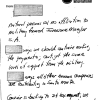
Soon thereafter, the AUC began to use Chiquita’s port facilities and ocean liners in Turbó (Urabá) to smuggle weapons and drugs in and out of Colombia. In one case, the 2001 “Easter Incident,” Buitrago said that Hasbún had given an order to allow an AUC weapons shipment to pass through Chiquita’s port operations, and that Buitrago had given a security camera videotape that recorded the incident to Hasbún to destroy.[36]
After another AUC drug smuggling incident the next year, Buitrago and Acevedo did not report that one of Chiquita’s inspectors had accepted a bribe to allow drugs aboard a ship bound for Belgium and had in fact tried to return the money to the AUC.[37]
Around the spring of 2002, an AUC official from Santa Marta told Buitrago that La Tagua del Darién, the Convivir in Urabá, was not sharing enough of its funds with his group. The official “demanded that all future payments intended for Santa Marta be made directly and in cash.”[38]
Around the same time, the company reengineered its paramilitary payments scheme. The demand for cash payments in Santa Marta led Buitrago and others at the company to implement new procedures for bringing funds for paramilitaries into the country. As described above in the profile of Banadex general manager Álvaro Acevedo, the money was hidden in Acevedo’s salary. Buitrago then “hand-delivered the cash directly to AUC personnel in Santa Marta.”[39]
The SLC Report describes how Ordman (“Chiquita Employee #2”), William Tsacalis, the chief accounting officer at Chiquita, and Robert Olson, Chiquita's general counsel, designed the new procedures to channel paramilitary payments through Acevedo’s discretionary account.
Tsacalis and [Chiquita Employee #2] designed, and Olson reviewed, a set of procedures for making cash payments to the AUC in Santa Marta. These payments were to be drawn from a “Gastos de Gerente” account used by Banadex’s General Manager for travel and entertainment expenses, and would be subject to accounting safeguards that went beyond those that were required for payments by check.[40]
The arrangement was also described in Ordman’s notes summarizing a March 28, 2002 telephone conversation that described the roles of Tsacalis, Ordman, Acevedo, Buitrago, and Robert Kistinger, President of the Chiquita Fresh Group.
Under the procedures summarized in the memo, the general manager, Acevdeo, “gets and keeps written receipt from Victor.”
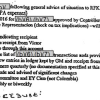
Like Acevedo, Buitrago also attended a 2003 meeting at Chiquita headquarters in Cincinnati where the decision was made to continue making the paramilitary payments, despite knowledge that that the AUC had been designated a Foreign Terrorist Organization in September 2001.[41]
In November 2003, Buitrago, Acevedo and two other Banadex employees met with senior Chiquita executives in Cincinnati to discuss their concerns about a U.S. Department of Justice investigation of the paramilitary payments, especially the possibility that their cooperation with the investigation would put them in danger. Around that time, the company received a series of emails from a “whistleblower” who said that Buitrago was affiliated with the AUC and had facilitated arms and drug shipments for them.[42]
On January 24, 2004, Buitrago “initiated the approval process for the final payment to the AUC in Santa Marta,” considered to be the company’s final payment to the paramilitary group.[43]
Banadex Attorneys and Legal Representatives
Reinaldo Escobar de la Hoz
As the lead attorney for Banadex, Escobar was directly involved in negotiations with guerrilla and paramilitary groups and developed the company’s legal strategy with respect to the security payments. Escobar resigned from the company in 1998 (and was subsequently rehired as outside counsel) after he was implicated in a bribe paid by Banadex to secure the renewal of a port operating license in Colombia.[44]
According to the SLC Report, Escobar, identified as “Banadex Employee #4,” was one of two Banadex employees, along with general manager Charles Keiser (“Banadex Employee #1”), who first made contact with AUC chief Carlos Castaño in 1996-1997.
According to [Banadex Employee #4], in late 1996 or early 1997, he was approached by Irving Bernal, a prominent banana producer in Colombia, who told him about “a very important meeting” regarding security issues. Bernal encouraged [Banadex Employee #4] to attend the meeting along with [Banadex Employee #1]. [The Banadex employees] met Bernal at Chiquita’s office in Medellín, and then followed him in a separate car to a large house in Medellín, where they met with Carlos Castaño, the well-known leader and public face of the AUC. Both [Banadex employees] recognized Castaño.
Castaño told Escobar and Keiser “that the AUC had begun a sustained offensive to drive the guerrillas out of Urabá.” He wanted the company to stop paying guerrillas and to start supporting the AUC.[45]
An article published in the Colombian newspaper El Espectador on September 20, 2009, describes the same 1997 meeting with Castaño and identifies Escobar and Keiser as the two Banadex officials who attended the meeting. The article includes a quote from Escobar in which he confirms that Bernal contacted him to arrange the meeting with Castaño. The article also includes a quote from Keiser in which he says that the paramilitary leader asked the company to stop making payments to guerrillas and start making payments to his group.
An internal Chiquita document produced by DOJ in response to our FOIA requests describes the same 1997 meeting with Castaño as well as a second meeting some months later with another paramilitary group that was demanding payment from Chiquita/Banadex.
The document, senior counsel Robert Thomas’ draft legal memo from September 2000, reveals that Escobar was contacted several months later by a “known Autodefensas [AUC] organizer and supporter” who “told him that Banadex needed to start paying 3¢/box to the new Convivir organization in Uraba called La Tagua del Darien.”

Over the next several years, Escobar was one of the few Banadex officials with detailed knowledge of how the company structured and concealed the paramilitary payments through the Convivir and other front groups.
Escobar was also a primary point of contact for Thomas during his investigation of the paramilitary payments in 2000.[46] In a March 2000 phone call with Thomas, Escobar explained why the company had been making “security payments” to a firm called Inversiones Manglar in Santa Marta. He said the firm was not a Convivir but performed the same function, which was to provide security. “Money for info on guerrilla movements,” read Thomas’ notes of the phone call.[47]
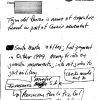
In 2001, it was Escobar who first reported to Chiquita executives in Cincinnati that a Chiquita-owned vessel was used to smuggle weapons into Colombia in the so-called “Easter Incident.”[48]
José Luis Valverde Ramírez
There is very little information in public records and the FOIA-released material about the role played by Valverde, a Costa Rican national who was a Banadex legal representative from 2000-2002.
Banadex Chief Administrative Officer
Dorn Robert Wenninger
Not much is known about the role played in the paramilitary payments scheme by Dorn Wenninger, a U.S. citizen who was the chief administrative officer for Banadex from 1999-2001 and is currently a vice president for Walmart Mexico.[49] He is probably best known for being among an elite group of super athletes to complete seven marathons on all seven continents in seven consecutive days.
Wenninger is one of a number of Chiquita officials who received a copy of a November 1999 memo from Steven Kreps on “Accounting for Confidential Payments.”
The only other document in the Chiquita Papers collection that mentions Wenninger, who would have been CAO of Banadex at that time, would appear to be exculpatory, at least with respect to the new paramilitary payment procedures implemented in 2003. That memo, a summary of John Ordman’s notes from a March 28, 2002 phone call, says that the paramilitary payments would be “approved by Controller only (no CAO approval).”
Banadex Chief of Labor relations
Luis Germán Cuartas Carrasco
Cuartas, a Colombian, was chief of labor relations for Banadex from 1990-2004. While there is little on the public record about the role played by Cuartas in the payments operation, from his position he would have overseen the company’s sensitive relationship with labor unions. As mentioned above (and in an article published last year), Banadex general manager Charles Keiser saw payments to guerrilla groups as a means of gaining leverage in negotiations with trade unions, some of which the company believed were affiliated with insurgent groups like the FARC and ELN.
Banacol Officials
Banacol is the Colombia-based firm that purchased Banadex from Chiquita in 2004 and which thereafter continued to supply bananas for international distribution by Chiquita.
Víctor Manuel Henríquez Velásquez
Henríquez is a Colombian banana executive who was president of Banacol from 2000-2004. In a 2012 interview with Semana magazine, Raul Hasbún said that Henríquez was a prominent supporter of his paramilitary forces and that they met nearly every month.[50]
Juan Diego Trujillo Botero
Trujillo was secretary general of Banacol beginning in 1995.
Javier Ochoa Velásquez and Jorge Alberto Cadavid Marín
Ochoa and Cadavid, both Colombians, were the legal representatives for farm enterprises affiliated with Banacol in the 2000s.
The documents

Document 01
Freedom of Information Act lawsuit
The Banadex security department (“Proteccion Industrial”) requests a payment to the FARC guerrilla group, identified here as “R” for “rojo” or “red,” the color code assigned to the group. The security department describes the terms of the agreement reached the FARC, noting that the group knows the true conformation of Banadex holdings in Colombia and the names of its staff. In a handwritten annotation, general manager Charles Keiser adds, “We should get from them an understanding not to block anything we do with the sindicato [labor union].”

Document 02
Freedom of Information Act lawsuit
The Banadex security department (“Proteccion Industrial”) requests a payment to the ELN guerrilla group. In a handwritten annotation, general manager Charles Keiser, whose signature of approval appears in the lower-right corner, says, “As with R [FARC] they should not block anything we do with the sindicato [labor union].”

Document 03
Freedom of Information Act lawsuit
Banadex security manager Juan Manuel Alvarado asks general manager Charles Keiser to approve a disbursement of 1,500,000 Colombian Pesos.

Document 04
Freedom of Information Act lawsuit
While it is not clear exactly when Chiquita made its first payment to a paramilitary-linked Convivir group, this memo is the first-known recorded payment. A handwritten annotation from general manager Charles Keiser reads, “No alternative, but next year needs to be less.”

Document 05
Freedom of Information Act lawsuit
A payment invoice form records the disbursement of 15,928,499 Colombian Pesos to La Tagua del Darien, a front company set up by the AUC paramilitaries to collect payments from Chiquita. The initials of Banadex general manager Charles Keiser are visible (“Firmado Por CK 31-08/99”).

Document 06
Freedom of Information Act lawsuit
Shortly after Álvaro Acevedo took over from Charles Keiser as the new general manager of Chiquita operations in Colombia, Steven Kreps, corporate vice president for internal audit at Chiquita, forwarded Acevedo a copy of his November 1999 memorandum on how to secretly account for “confidential payments” like those the company was making to the AUC paramilitaries (through Convivir groups).

Document 07
Freedom of Information Act lawsuit
The chief financial officer for Chiquita’s wholly-owned Colombian subsidiary (“Banadex”) gives a sworn deposition before investigators of the U.S. Securities and Exchange Commission (SEC). The SEC is looking into allegations that Banadex paid a bribe to Colombian port officials. In the process of doing so, the SEC uncovers a great deal of information about the company’s payments to Colombian guerrilla and paramilitary groups and their efforts to conceal the payments in a secret accounting system.

Document 08
Freedom of Information Act lawsuit
The handwritten notes of Chiquita senior counsel Robert Thomas record his phone call with Banadex attorney Reinaldo Escobar and chief financial officer John Paul Olivo. During the call, Escobar told Thomas that the AUC paramilitaries had formed a new front company, Inversiones Manglar, to collect payments from the company, since the Colombian government was not allowing any new Convivir groups to be formed.

Document 09
Freedom of Information Act lawsuit
The handwritten notes of Chiquita senior counsel Robert Thomas record his August 2000 debriefing of Alejandro “Al” Bakoczy, Chiquita’s chief of security.

Document 10
Freedom of Information Act lawsuit
In a memorandum to file, Chiquita senior counsel Robert Thomas lays out information he has gathered about the initial encounters between Banadex officials in Colombia and members of the paramilitary United Self-defense Forces of Colombia (AUC).

Document 11
Freedom of Information Act lawsuit
In this brief memorandum, John Ordman, the Senior Vice President for European Banana Sourcing at Chiquita, summarizes new procedures for making and recording payments to Colombian paramilitary groups and describes the roles of various members of the company in the process.

Document 12
Freedom of Information Act lawsuit
An email from Banadex chief financial officer Fuad Giacoman and addressed to Banadex general manager Álvaro Acevedo and others explains how an increase in Colombian income tax would effectively increase the amount of money the company paid in security payments, since they were disguising the payments as “manager fund payments.”

Document 13
Chiquita Brands International, briefing slides, non-classified, 11 pp.
Freedom of Information Act lawsuit
A set of internal briefing slides on “Colombian Logistics Operations” shows that Banadex chief financial officer Fuad Giacoman had reported procedural violations connected to some nine incidents where Chiquita vessels were used to transport drugs to Europe. The slides also indicated that “Manrique [Ugalde] and Fuad [Giacoman] refuse to be Legal Representatives due to concerns for their safety and their personal legal responsibilities for decisions made by others outside of the Division and in violation of existing procedures.”

Document 14
U.S. District Court for the District of Columbia
Lists facts and circumstances surrounding $1.7 million in payments by Chiquita Brands International to the United Self-defense Forces of Colombia (AUC).

Document 15
Special Litigation Committee, Chiquita Brands International
Examines whether Chiquita officers and directors breached their duties to the company in violating U.S. anti-terrorism statute.
Notes
1. Olivo SEC deposition, p.132.
2. Olivo SEC deposition, pp.66-67.
3. https://www.un.org/en/genocideprevention/crimes-against-humanity.shtml
4. https://www.fiscalia.gov.co/colombia/noticias/por-masacre-de-mapiripan-condenado-ex-cabecilla-del-bloque-bananero ;
5. John Ordman was based in Costa Rica. Robert Kistinger and Wilfred “Bud” White were based in the United States.
6. The Factual Proffer refers only to “Individuals” A-J.
7. SLC Report, pp.30-31.
8. SLC Report, p.32.
9. There is a similar memo from the same date about a payment to the ELN. Keiser’s annotation on that memo reads: “As with R [FARC], they shouldn’t block anything we do with the sindicato.”
10. SLC Report, p.47.
11. SLC Report, pp.47-48.
12. Factual Proffer, p.5.
13. The first page of the handwritten notes from August 2000 was not provided in the digital file provided by the Department of Justice.
14. [TK – note on the various draft versions of the Thomas memo to file.]
15. “Chiquita Employee #1” is Alejandro “Al” Bakoczy, Chiquita’s vice president for security.
16. SLC Report, p.48.
17. SLC Report, p.50.
18. SLC Report. pp.60-61
19. SLC Report, p.102.
20. The November 30, 1999 Kreps memo was distributed to a number of Chiquita officials, including Dennis Doyle, Charles Keiser, Robert Kistinger, John Paul Olivo, Robert Olsen, John Ordman, Robert Thomas, William Tsacalis, and Dorn Wenninger.
21. SLC Report, pp.80-81.
22. Factual Proffer, pp.6-7.
23. SLC Report, pp.82-83.
24. SLC Report, p.89.
25. SLC Report, p.62. Olivo is identified here as “Chiquita Employee #3.”
26. Olivo SEC deposition, p.28.
27. Olivo SEC deposition, pp.54-55.
28. Olivo SEC deposition, pp. 55-56.
29. Olivo SEC deposition, p.64.
30. Olivo SEC deposition, p.132.
31. Ibid.
32. Olivo SEC deposition, p.59.
33. Olivo SEC deposition, p.94.
34. SLC Report, p.42.
35. SLC Report, pp.61-62.
36. SLC Report, pp.72-73.
37. SLC Report, pp.74-75.
38. SLC Report, p.80.
39. Buitrago is identified as “Individual G” in the DOJ’s Factual Proffer.
40. SLC Report, pp.80-81.
41. SLC Report, pp.89-90.
42. SLC Report, p.113.
43. SLC Report, p.125.
44. Gallagher, Mike and Cameron McWhirter, “Chiquita Secrets Revealed,” Cincinnati Enquirer, May 3, 1998.
45. SLC Report, pp.47-48.
46. SLC Report, pp.49-54; p.62.
47. In addition to Thomas’ notes, the March 6, 2000, call is also discussed in the SLC Report at p.62.
48. SLC Report, p.72.
49. https://www.linkedin.com/in/dorn-wenninger-a5329a/
50. https://www.semana.com/nacion/articulo/el-hombre-cerebro-paraeconomia/255742-3

